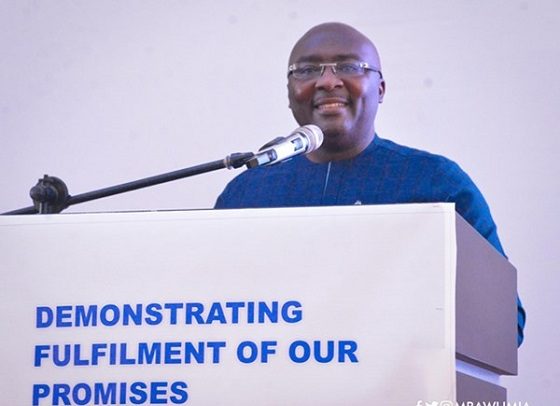Vice-President Dr. Mahamudu Bawumia
Vice-President Dr. Mahamudu Bawumia has rekindled the heated debate on the management of the cedi against the major foreign currencies, especially the United States dollar, describing the performance of the National Democratic Congress (NDC) as the worst since Ghana returned to constitutional rule some 28 years ago.
“Under the NDC, our currency was depreciating at the speed of Usain Bolt! Under the NPP, we have arrested the rapid depreciation of the cedi,” he fired in Kumasi yesterday during a town hall meeting to give an assessment of the status of the 2016 Manifesto Promises of the ruling New Patriotic Party (NPP).
Facts & Figures
Explaining the facts and figures with tables and diagrams, the Vice-President said, “All the worst performances happened under the NDC which holds the record for first, second and third worst performances in the Fourth Republic but they still want to challenge the best performers!”
“But why does the NDC, in the face of such incontrovertible evidence, keep insisting they can do a better job of managing the cedi? Ladies and Gentlemen, it is like you take an exam with somebody and he scores 40% and you score 80% and he is trying to convince people that he knows the subject better than you; ?y? as?mooo!” he said to a spontaneous laughter from the audience.
Nana The Best
He said it was a fact that in the history of the Fourth Republic, President Akufo-Addo has the best performance in the management of the cedi for any first term government since 1992.
“You can see that the cedi exchange rate under the NPP (2017-2019) is twice as stable as it was under NDC (2013-2016) – average depreciation of 18% compared to 8.7%. The cedi is depreciating at half the speed that it used to,” the revered economist said.
He mentioned that factors such as inflation rate, balance of trade, fiscal balance, money supply (the fundamentals) influence the exchange rate and added that speculation and expectations about these fundamentals, external shocks such as oil price increases could also have powerful short-term impacts on the exchange rate.
“The exchange rate is a price just like the price of any good or service. It is the price of one currency relative to another. How much of one currency does one need to give up to get one unit of another currency? The rate of exchange generally reflects the purchasing power of one currency relative to another,” he added.
Basic Types
He said countries have a choice between two basic types of exchange rate regimes (and variations in between) and Ghana has opted to manage what he called ‘floating exchange rate regime’ as against a ‘fixed exchange rate regime.’
“For that reason, we can or should never expect that the exchange rate will be fixed; it will not be. It will fluctuate depending on demand and supply. What policymakers can do is to try to control the rate of depreciation or appreciation of a currency through sound policies,” he pointed out.
The Vice-President said “therefore, in the context of a floating exchange rate regime, arresting the depreciation of a currency can only mean slowing down the rate of depreciation or stopping a rapid and volatile depreciation of the currency.”
Fundamental Theory
“The fundamental theory of exchange rate determination tells us that depreciation or appreciation of a currency (other things being equal) will therefore reflect inflation differentials of the two economies. Higher inflation will result in higher depreciation. If the inflation differential is 20% then one can expect a 20% depreciation of the higher inflation currency. However, if the inflation differential is 5%, then 5% depreciation can be expected (other things being equal),” he explained.
He said in general terms, there tends to be what he called “a direct relationship between higher inflation (especially non-food price inflation which has higher import content) and exchange rate depreciation/appreciation.”
NDC Performance
Dr. Bawumia said that at the end of 2008, the exchange rate of the cedi to the dollar was GH¢1.18/US$ but added that “at the end of eight years, the nominal exchange rate almost quadrupled to GH¢4.2/US$.”
He said, “But thus far under the NPP, the exchange rate has moved from 4.2/$ at the end of 2016 to 5.35/$ (Bank of Ghana). Indeed, for the NPP to match the almost four-fold Usain Bolt-like dash of the nominal level of the cedi exchange rate under the NDC, the cedi exchange rate will have to reach some GH15/US$!”
“The cedi is performing quite well and is currently the best performing currency in the world against the US dollar (with an appreciation of 3.4% in January) thanks to the excellent management of the Bank of Ghana,” he said.
From Ernest Kofi Adu, Kumasi


